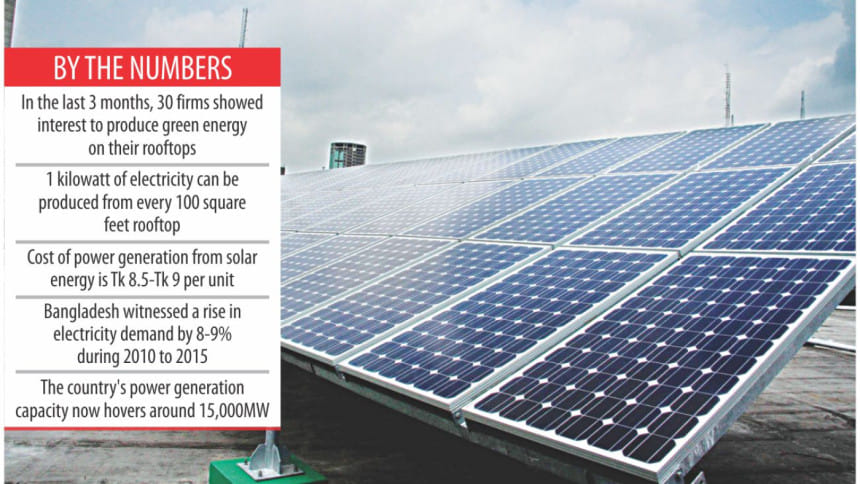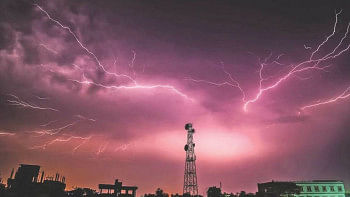Industrial units setting up solar panels on rooftops

Entrepreneurs are making the best of the rooftops at their industrial units by installing solar panels to meet part of their energy demand and cut reliance on the national power grid.
In the last three months, 30 companies showed interest in setting up solar panels on their factory rooftops, said a senior official of Infrastructure Development Company Ltd (IDCOL).
“We are planning to finance these projects, considering the potential. There are many factories where more than 2MW of electricity can be produced by utilising the rooftop space,” said Md Enamul Karim Pavel, head of renewable energy of the non-bank financial institution that bankrolls renewable energy projects in Bangladesh.
Designer Fashion Ltd, a unit of Bengal Group of Industries, has already started installing a 300 kWp solar panel at its woven garment factory in Savar, said Md Raziur Rahman, who is in charge of activity coordination at the factory.
“We have to suffer from load shedding on a regular basis. The solar power will provide partial back up when there is a power cut,” he said.
“We will use solar electricity for the emergency lights at the fire exits, staircases and street lights, to ensure workers' safety and security.”
Rahman said the company wants to meet 14 percent of its electricity demand through rooftop solar energy.
Industrialists eye green energy at a time when the demand for electricity is growing to meet the requirements of Bangladesh's $220 billion economy, expanding by more than 6 percent a year.
The country witnessed a rise in peak electricity demand by 8-9 percent from fiscal 2009-2010 to 2014-15 due to an increase in population, urbanisation and expansion of economic activities, according to the draft Energy Security Study by the power division.
The power generation capacity also grew fast in recent years, hitting 15,351MW. But industrialists demand uninterrupted supplies of electricity to run production smoothly and protect the machines from damages caused by sudden power outages.
The rising electricity tariff has also become a matter of concern.
IDCOL's Pavel said 1 kilowatt of electricity can be produced from every 100 square feet of rooftop space. So, a factory that has 1 lakh square feet of space will be able to produce 1 megawatt of electricity.
He said per unit cost of electricity generation from solar will be Tk 8.5-Tk 9, which is equivalent to the cost of electricity bought from the state-run utility service providers.
Solar energy will be cheaper if the possibility of future power tariff hike is taken into consideration, said Pavel, adding that entrepreneurs would also be able to sell the electricity to the government.
“We are planning to finance some of these projects within the next three months, so they can start power generation this year,” he said.
Sarwar Hossain Shaheen, deputy general manager of Paragon Group, a well-known name in the poultry industry, said the global prices of solar panels have come down substantially in the last two years, making investments in solar panels financially viable in Bangladesh.
It plans to install solar panels to produce 735 kWp at the Paragon Poultry farm in Gazipur -- it will use 350 kWp to meet the electricity demand at the farm at daytime and the rest will be supplied to a feed mill under the group, added Shaheen.
The farm pays more than Tk 8 for per unit of electricity coming from a state-run utility service provider. “We will be able to save a lot if we generate solar electricity on our own.”
Installation of solar panels on the rooftop will also be instrumental in keeping the temperature inside the farm low and protecting the poultry birds from a heat stroke.
Paragon aims to go for the project using finance from IDCOL, he added.
Md Shariful Islam, general manager for power generation at Youth Group, also said the company is looking to produce 2MW from solar energy at its Comfit Composite Knit Ltd, which has 180,000 square feet of rooftop space.

 For all latest news, follow The Daily Star's Google News channel.
For all latest news, follow The Daily Star's Google News channel. 



Comments